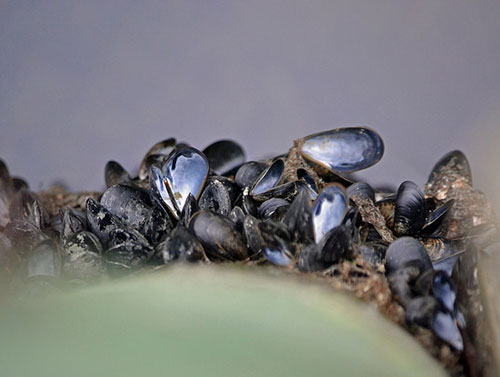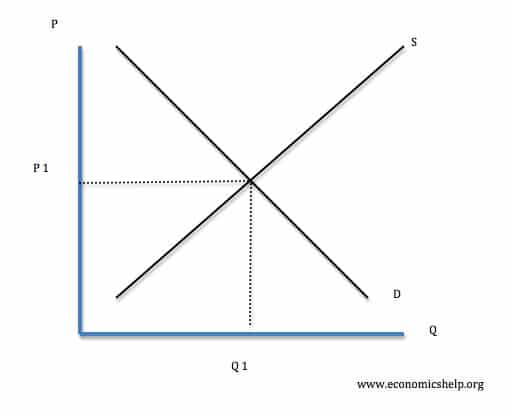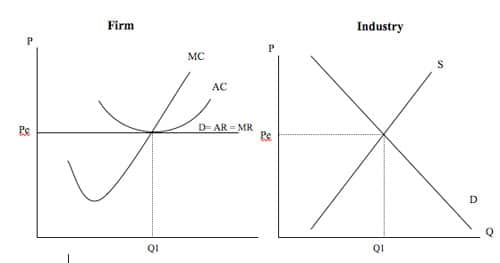Readers Question. I came across a company recently which farms mussels of the coast of a small town in Bulgaria, and I started thinking about its structure in the economy. I know since it produces a homogeneous product along with hundreds of other mussel farmers, it must be in perfect competition, however this mussel company also sold locally on top of selling to suppliers. This means it was the only mussel supplier (locally) in the town, and as far as I know that’s a monopoly. My question is, what would this company’s graphs look like? Would it be more like a perfect competition, or a monopoly? Although it is the only supplier in the town, it sells the mussels at the same price if not cheaper to locals as it does to suppliers, which I know unlike monopolies. Would there be any deadweight loss in a company like this? Is it inefficient or is it more efficient than normal? Consumers can buy mussels from the supermarket, but local supermarkets all get their supply of mussels from this one local company. Please help me understand!
Firstly, this is the first time I’ve been asked about the Bulgarian mussel market so I can’t claim any specialist knowledg.
But, Selling mussels does look like it exhibits features of perfect competition.
- There are many farmers (sellers)
- It is an homogeneous product
- Buyers are likely to have good information about the product and price.
The market price is likely to be determined by a simply supply and demand curve
Selling locally – Is it inefficient or is it more efficient than normal?
If the local mussel farm sells to a local town, I don’t think makes it a monopoly. I’m sure that local restaurants and supermarkets could choose to buy from other distributors. But, local restaurants probably find that the local mussel farmers can undercut distributors because effectively they are cutting out the ‘middle man’ and transport costs
If the local mussel farmers sold above the nationwide price, restaurant owners would buy from the more traditional distributors. So there is still a degree of competition.
In this sense it is more efficient than normal because you can go from supply direct to retail, and cut out transport costs and the efficiency loss of selling on to a distributor.
In one sense the mussel farmer may have local monopoly power, but this is far outweighed by the lower costs and greater efficiency of being able to supply direct to the local market.
Also, if you say there are several different mussel collectors in the area, then they will face competition from each other. If there was only one mussel farm in the region, they might have a degree of monopoly power in that if you wanted to buy locally collected mussels – there is only place to get them from. However, if there is competition from imported mussels or mussel farmers along the coast, this will keep the market fairly competitive.
Contestable market
If a local farmer did start selling at a very high price, I would assume this would encourage new firms into the market. Collecting mussels seems an industry with relatively low sunk costs and low barriers to entry. Therefore, this threat of competition would be sufficient to keep prices low.
How do you define the industry?
Another issue is that if mussels became really expensive, maybe people would switch to other types of sea-food, like snails or squid (I’m vegetarian so I’m no expert on what people may prefer). But the point is eating mussels is not like buying petrol. There are many close substitutes to mussels.
However, I may be wrong on this point. Perhaps consumers see mussels as a particular speciality. Because it is a relatively small % of income, many consumers may be unaffected by a rise in price and continue to buy. This would increase any monopoly power of mussel growers.
Perfect competition
Overall, I think the most likely scenario is that the firm is likely to face a relatively elastic demand curve. If it tries to increase the price, like a monopolist, there would be a relatively big fall in demand.
Related
Photo: mtsofan Flickr, creative commons




I dare say, this reminds me of age-old monopoly discussions that never seem to die out. “… only mussel supplier (locally) in the town, and as far as I know that’s a monopoly…” Of course that is not a monopoly. It would be a monopoly, if no one else could SUPPLY mussels. Then it would be a monopoly and they could charge “any” price they wished. Would they? No, because then, they’d sell less or nothing, depending on the price. Even a monopolist wants to maximize profits which is a completely different thing from maximizing prizes. The latter does not normally accomplish the former. As for your notion of “perfect” competition: this is another idea that has led to great harm in economics and has seen the advent of monopoly commissions deciding what a “market” was etc. This is, I’m sorry to say, all nonsense: there is never any such thing as perfect competition. One customer likes his produce packed in a brown parcel, the other in red. One does not by from a Muslim grocerer, the other has something against Catholics or Jews. The next goes left to shop as further down from there is the place he works and it makes no sense for him to first turn right to grab a pack of mussels a cent cheaper if he/she then spends more time and fuel. Forget the perfect competition and the idea of monopolies. If there was a mussel monopoly and people didn’t like the price then they’d buy bread or snapper or lobsters or …